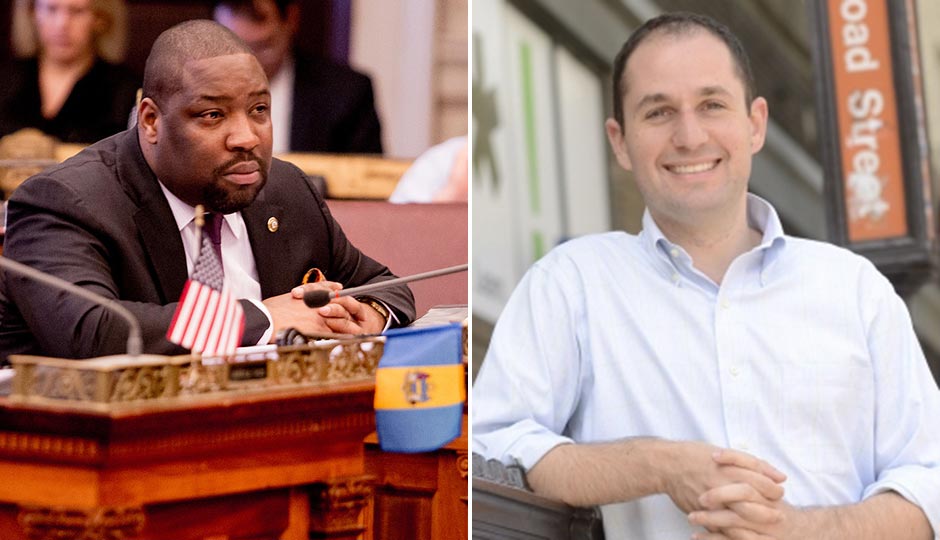The Ori Feibush V. Kenyatta Johnson Verdict Is In: Feibush Won

Kenyatta Johnson. Photo | Jeff Fusco. Ori Feibush. Photo | Creative Commons SA 2.5
A jury determined on Wednesday that Councilman Kenyatta Johnson blocked the sale of two vacant lots in Point Breeze to developer Ori Feibush in an act of political retaliation.
The jury found in favor of Feibush, who filed suit against Johnson in the summer of 2014 in the midst of a campaign to take Johnson’s City Council seat. It awarded Feibush compensatory damages of $34,000. Feibush had sought damages of $275,000.
The case was functionally a trial against Councilmanic prerogative, a tradition that gives Council members discretion over development and land sales in their districts. After a day-and-a-half of testimony, the jury decided that prerogative was the motivating force that led to Johnson’s refusal to sell the properties. That refusal violated Feibush’s First Amendment right to free speech in the form of his political campaign against Johnson. The jury also found that Johnson abused his prerogative, but it isn’t totally clear whether the ruling will have any impact on Council’s widespread, day-to-day use of the power.
“I’m relieved,” Feibush said after the verdict was delivered. “I’m grateful that the jury was able to understand the nuance of the case and what was going on and how Philadelphia operates, and was able to return a fair verdict that hopefully makes some real changes in our city.”
Feibush said he had sunk “real money” into developing the lots before being denied the sale. The amount of damages he sought reflected those costs as well as the profit he had expected to make on the development.
“We respect the jury opinion, but the city is determined to appeal this verdict because there are wider issues at stake,” Johnson said Wednesday in a statement. “The verdict may compromise a city legislature’s ability to properly represent the people who elected them. Constituents expect that we will use discretion and judgment in making decisions that have a life-altering consequences. This verdict is not about me. It will have a chilling effect on the entire Council’s ability to take controversial or unpopular positions regarding land disposition in favor of people who are being shoved aside for investor profits.”
The case revolved around two city-owned vacant lots on Cleveland Street in Point Breeze. Early in 2014, Feibush was one of a handful of individuals who had bid on the lots through a Philadelphia Redevelopment Authority auction, and planned to build single-family housing there. Councilman Johnson had initially given his approval to let the properties go to auction, according to testimony in the trial.
After Feibush was notified that he was the winning bidder, the land sales were approved by the Vacant Property Review Committee. That committee then drafted a City Council resolution authorizing the sale, which is required by the city charter, and gave it to Johnson. But Johnson declined to introduce the resolution.
Feibush claimed that Johnson’s refusal to authorize the sale was motivated by politics. Feibush was running against him at the time for the 2nd District Council seat. Johnson claimed that the move wasn’t political — he simply wanted to set the lots aside so affordable housing could be built there.
Earlier, in December of 2013, Johnson had authorized the sale of six vacant lots in Point Breeze to Feibush. That was a month after Feibush had notified the Board of Ethics he was running for office and six months after Feibush had essentially announced his intentions in Philadelphia magazine profile. Johnson’s lawyers said that showed that the refusal to authorize the Cleveland Street land sales wasn’t political: Why would Johnson allow six lots to be sold to his opponent if he was using his District Councilmember powers to play politics?
Feibush’s lawyer, Wally Zimolong, played up the First Amendment implications of the case throughout the trial. Feibush worked the PowerPoint slides while Zimolong gave his closing statement, which began with a short history lesson about the American Revolution. He acknowledged that there wasn’t a “smoking gun” in his evidence — no emails from Johnson or his staff discussing how to get back at Feibush for the political challenge. But he said the timeline suggested that Johnson was abusing Councilmanic prerogative, which gives him “a tremendous amount of power.”
Johnson had claimed in his testimony to take a hands-off approach to specific land sales in his district, Zimolong noted. But the one time he did intervene, it was to block a sale to Feibush. Johnson had testified that Feibush was “the face of gentrification” in Point Breeze. And Zimolong said that Johnson wanted to stop gentrification.
Johnson’s lawyers, John Coyle and Michael Miller of the city’s Law Department, agreed that Johnson was trying to do something about gentrification when he refused to authorize the sale. It was just more innocent, they said: He wanted to save the lots for affordable housing. They argued it would make no sense to sell six lots to a known political opponent — which Feibush turned around for a profit of roughly $450,000 — and then refuse to sell him two more lots a few months later because of politics.
“It is remarkable to argue that not getting two lots in that context would discourage you from running for office,” Coyle said.
After the jury delivered the verdict and was dismissed from the courtroom, Zimolong delivered a bombastic fist pump.
Coyle said outside the courtroom that the city plans to appeal the verdict. The city will also file a post-trial motion asking for the judge to rule, as a matter of law, that Councilmanic prerogative itself couldn’t have been the cause of Johnson’s actions, and instead that it was only the vehicle.
This is a developing story. Check back for more.
Follow @JaredBrey on Twitter.